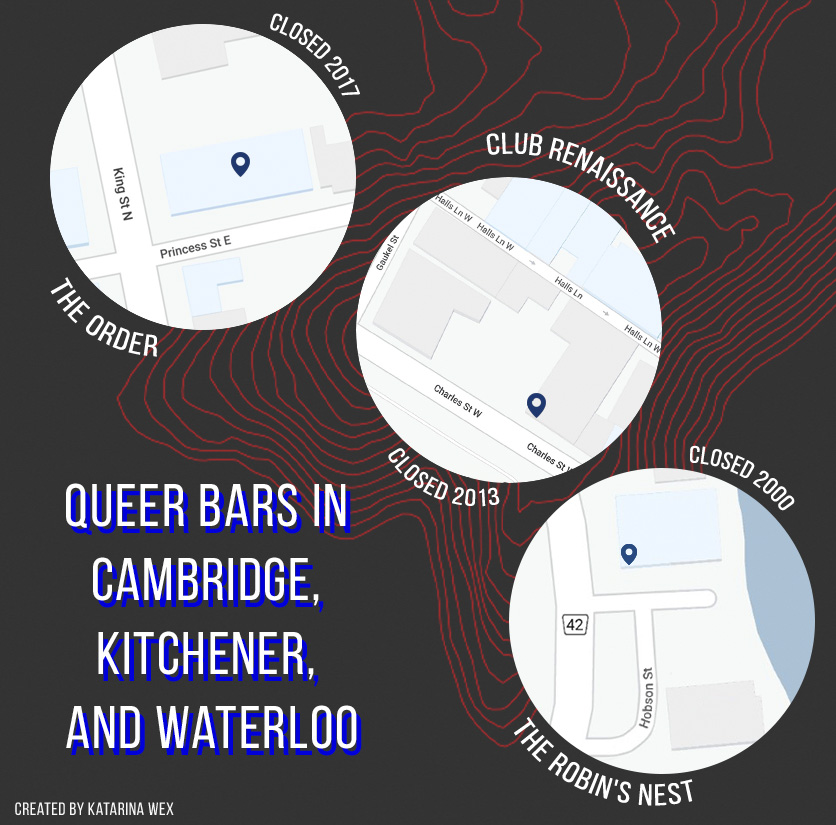The Waterloo Region’s last 2SLGBTQ+ bar, Club Rennaissance (Club Ren), shut its doors in 2017. Since then, the queer and trans members of the community have not had a specifically designated safe bar.
“Club Rennaissance was the best place to go, the only place to go that we knew at the time. I wasn’t openly out, and I wasn’t as knowledgeable about my own culture,” Amy Smoke, of the Mohawk Nation Turtle Clan from the Six Nations of the Grand River said.
Historically 2SLGBTQ+ or “gay” bars have been a safe space for many in the community when they do not feel safe at work, school or home. The Tri-Cities has had a rich queer and trans history.
For 33 years, Cambridge was home to an underground lesbian bar called The Robin’s Nest which opened in 1977. Kitchener had Club Ren, a gay bar on Charles St. that opened in 1994 and shuttered its doors decades later. The Order opened in 2012 in Uptown Waterloo which shut down in 2017.
According to a report by Emily Cox, Researcher, BIPOC members of the 2SLGBTQ+ have experienced discrimination and systemic racism when trying to access adequate services.
“It [Club Ren] felt a little more
friendly, but it still felt like there was a difference between being a queer person and a brown person,” Smoke said.
Over the past few years, there has been a push for more queer and trans spaces that are inclusive to Black and Indigenous people of colour.
QTPOC KW is a student-run club out of the University of Waterloo that provides a space for people at the intersection of 2SLGBTQ+ and racialized (BIPOC) identities. As an organization, they host community socials, panels and other events that uplift people who are part of these communities.
“We come into our identities into our circle, we come into the spaces that we once had,” Smoke said.
Smoke wants people to be mindful of queer spaces in Waterloo Region. Indigenous people have historically been displaced from their land
and space. Being able to know how to make 2SLGBTQ+ spaces more inclusive and welcoming towards BIPOC, it is important to have organizations like QTPOC KW.
They want to remind people that because Indigenous people are consistently displaced from their land, it is not fully inclusive to all queer and trans people if the only spaces discussed are famously very White. As they were growing up,
they wished there were Black and Indigenous people of colour (BIPOC)- friendly queer spaces in the region.
“Growing up here in Kitchener- Waterloo. I didn’t have any strong Indigenous role models for me. And I didn’t also have any queer role models. I didn’t know that being Indigenous and queer was a thing,”Smoke said.
“It [Robin’s Nest] was this old country and western bar and it was just full of smoke, and everyone was line dancing. An older woman with a curly mullet and cowboy boots asked me to dance and it was the most magical introduction to queer bars that I’ve ever could have asked for,” said Ellie Anglin, another lifelong resident of the KW Region.
Although The Robin’s Nest was mainly there for lesbians, it was an inclusive space for gay, straight and transgender folks. It was officially called a “Sports and Recreation Club” but was a queer dance club for those who knew.
“I think a lot of that queer community in KW operates on a bit of a word-of-mouth kind of basis. And you must be in the know a little bit already to know about queer events and queer culture,” Anglin said.
However, many in the community have expressed their desire for a dedicated safe space and/or nightclub today. While there seems to be no shortage of community services and support for the 2LGBTQ+ community at large, these may not be enough for everyone.




Leave a Reply